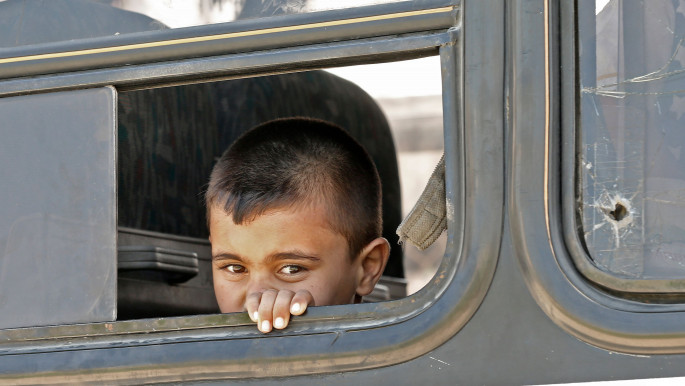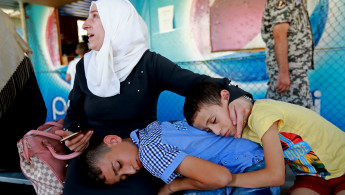History reflected: Memories of Lebanese displacement to Syria dismissed by Lebanese calling for Syrians' repatriation
Lamenting its immigration crisis, Europe has - with perhaps the exception of Germany - responded by securitising its borders and voting in a series of leaders whose anti-immigration rhetoric accelerates by the day. It is Syria's neighbours however, who have been most affected by the Syrian displacement.
Lebanon, a small country now of six million, currently hosts the highest number of refugees per capita in the world. Having not yet recovered from its own civil war, the country of Cedars exists in a precarious sectarian balance, constantly threatened by spill-over violence from the conflict raging just across the border.
In Lebanon's northern city of Tripoli, historic clashes between the Alawi Jabal Mohsen neighbourhood and the Sunni districts of Beb Al-Tabenneh and Qobbe were re-ignited by the start of the war in Syria. Despite the relative calm of the past few years, every building here is pock-marked with bullet holes.
Stopping at a café on Syria Street, the frontline that emphatically separates Jabal Mohsen from Beb Al-Tebbeneh, we meet Marwan and Hussein. The café we enter has colourful cushioned chairs and bright walls with paintings and TV screens. A local NGO set up the space to carry out reconciliation projects between the two communities.
Marwan is from Beb Al-Tebbeneh, Hussein from Jabal Mohsen. They grew up playing in each other's streets, until the climate became loaded with mutual suspicion at the start of the war in Syria, finally releasing that tension into open conflict. At this time, many Lebanese also joined the war in Syria.
 |
|
"I went to fight for the [Syrian] regime," Hussein tells The New Arab. "I went out of boredom, I couldn't properly use my brains because of all the drugs I was taking. I wasn't conscripted.
"Like many others in Jabal, I had no job and half of my family are Syrian, so it made sense to me at the time."
|
This article is the second in a six-part series investigating the issues of return of Syrian refugees from Lebanon. |
Next to him, Marwan continues, "In 2015 the Lebanese army raided my house and arrested my father. I was 16 at the time, I had nothing left. I joined my brother fighting for anti-government militias in Syria."
He pauses. Then: "I came back after a few months but my brother went on to fight for al-Nusra and never came back."
Hussein agrees. "All of the politicians are the same. They are the real problem. They want to keep us in poverty so that whenever they want to send a message to Hizballah or the Syrians they just re-ignite the clashes between us. They try to punish Syria or Hizballah by punishing us."
Marwan nods in agreement. "If they built factories here, Sunni and Alawi would work together. No one would want to become a fighter, no one prefers throwing bombs to a good job."
Hussein and Marwan's tentative friendship speaks of the remarkable resilience of communities here.
"The problem now is that the Syrians [in Lebanon] have taken all our jobs. And they work for nothing."
With exasperation tainting his voice, Marwan asks: "How can we compete with them? Five dollars a day? How can I feed my family with that?"
 |
The problem now is that the Syrians [in Lebanon] have taken all our jobs. And they work for nothing... How can we compete with them? |  |
The sentiment in Marwan's words is common among the poorest Lebanese rural and working classes, as the weight of hosting more than a million refugees takes its toll.
It is the same sentiment reflected in most Lebanese politicians' call for refugees to start returning to Syria, in spite of international consensus that Syria is not yet safe for return.
Ten kilometres from the Syrian border in Lebanon's northern province of Akkar, we meet Tony Abood, mayor of the Christian Orthodox town of Minyara, and national representative of twelve local municipalities.
Locally known for his position in favour of Syrian repatriation to alleged safe zones, he tells us: "There is no way Lebanon could remain untouched by what happened in Syria."
Abood insists that most of Syria is now safe to return.
"When the Syrians first came, we welcomed them. But now they need to go back." As an afterthought he adds: "Not all of them. We need some to stay to work on the land. And of course, those who fear returning will not be forced, but most Syrians want to go back."
 |
When the Syrians first came, we welcomed them. But now they need to go back |  |
 |
|
| A group of Syrian refugees left the Lebanese capital for their homeland in September as part of an organised operation between Lebanese and Syrian authorities [Getty] |
Overlooking the ragged camps sprawled across the valley of Minyara, it is hard to imagine that anyone would choose to stay in such dire conditions unless they feared that what awaited them back in Syria was worse.
Widespread reports of torture, imprisonment and conscription of those who have returned illustrate just how unsafe return is for most Syrians living in Lebanon.
But many Christian Lebanese from this village found refuge in Syria during the Lebanese civil war.
"If twenty thousand Lebanese went to Syria they would never be a burden in a population of 30 million," says Abood. "But when in Lebanon we have one Syrian for every four Lebanese, the proportion is nowhere the same."
Evidence suggests that the movement of Syrians fleeing to Lebanon has contributed in straining the Lebanese economy as well as increasing security risks.
"We do not want the Syrian war to affect Lebanon and our stability," says Leah, a resident of Anjar, a town east of the Beirut-Damascus highway, in the Bekaa Valley. The memory of Syria's military occupation of Lebanon (1976-2005) is still fresh in her family. In Anjar, a tall grey building hosted the Syrian military headquarters - infamous for its prisons.
"My dad always tells me how he used to be able to hear screams coming out from there," says Leah. "They didn't even bother to shut the windows, they wanted people to hear."
Leah, who today works for the UNHCR registering Syrian refugees, continues: "Sometimes I register Syrians of my dad's age. I'm sure some of these men must have done their military service here during the occupation."
She frowns slightly. "They took my uncle for nine months. One day, he simply vanished. No one knew where he was. And when he was released, they never explained why he was taken in the first place."
Memories of torture, arbitrary detention and murder from the Syrian regime are reminiscent of the stories being reported by Syrian refugees currently fleeing Syria.
North of Anjar is the village of Arsal, infamous for having been overrun in 2015 by anti-regime fighters and the Islamic State group [IS]. It took months of fighting for the Lebanese army and Hizballah militias to regain control of the area.
"It's scary, when you see the violence spill over into your own country," she sighs. "I understand what the evil Syrian regime is capable of, but at the same time, I wish the Syrians would just go back to Syria and leave Lebanon in peace."
 |
I understand what the evil Syrian regime is capable of, but at the same time, I wish the Syrians would just go back to Syria and leave Lebanon in peace |  |
The growing resentment towards Syrian refugees is pushing the dire conditions of Syrians in Lebanon to the brink. Random arrests, detentions, and raids are commonplace. And as the UNHCR cuts support for refugees due to lack of resources, many are left without support, adding to the impossibility of finding legal work.
In agreement with the Syrian national security apparatus, the Lebanese government has started registering refugees who want to return.
Requests get checked by Syrian authorities first and if approved, refugees are allowed to return. But despite the announcements, there is no clear evidence that such return schemes have actually been successful.
Despite the pressures Lebanon has faced from the consequences of the Syrian civil war, it has largely resisted getting caught up in the violence.
Mindful of their own civil conflict and its sectarian nature, the Lebanese population has managed to maintain their precarious peace, in spite of the growingly sectarian nature of the violence perpetrated in Syria, and the influx of 1.5 million refugees that followed.
"Maybe we have learned our lesson," says Fouad Dirani, a former fighter and member of the Lebanese association Fighters for Peace.
"I just hope we can treat the Syrian refugees a little longer with compassion. Even if we are still dealing with the consequences of our own civil war, we must remember that what most Syrians want is to just find some peace."
Roshan De Stone is a human rights advocate working in Syrian refugee camps in Lebanon. She is a full-time contributor to Brush&Bow.
David L. Suber is a political researcher and journalist. He is directing a documentary on deportations from Europe and currently lives in Lebanon, where he works in refugee camps. David is also a full-time contributor to Brush&Bow.



